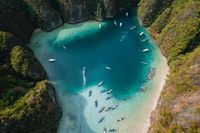In a significant development for marine conservation, the National Park of Hat Noppharat Thara - Koh Phi Phi in Krabi, Thailand, has announced the reopening of nine popular diving and snorkeling sites. This decision follows a temporary closure initiated on May 13, 2023, aimed at rehabilitating coral reefs affected by bleaching. The reopening, set for April 17, 2025, comes after a successful assessment indicating that many coral areas are showing promising signs of recovery.
Park Chief Mr. Saengsuri Songthong reported that a team conducted an evaluation of the coral reefs on April 9, 2025, and found that the conditions of the reefs at various sites have improved significantly. "The assessment revealed a positive trend in coral recovery, which has led us to believe that it is now appropriate to resume diving activities," he stated.
The areas that will reopen include the northern and eastern sides of Chicken Island, the northern side of Poda Island, Puya Bay, Red Island, Railey Bay, Bird's Nest Island, Yawasam Island, Loh Bagao Bay, Viking Cave, and the front of Pi Leh Bay. However, the western side of Chicken Island and Bat Cave will remain closed to allow for continued ecological restoration.
Mr. Saengsuri emphasized the importance of responsible tourism in preserving these natural resources. He urged visitors, tour operators, and guides to adhere strictly to park regulations to avoid environmental damage. "We ask everyone to refrain from actions that could harm the ecosystem, such as littering or anchoring boats on coral reefs," he added. Violations within the national park could result in severe penalties, including fines and imprisonment, as authorities work to protect these vital ecological resources.
The decision to reopen diving activities is seen as a positive sign for the marine ecosystem in the Phi Phi Islands, demonstrating nature's resilience when given the chance to recover. This initiative reflects a broader commitment to responsible tourism and environmental stewardship, which are essential for sustaining Thailand's rich natural heritage.
In other news, Hollywood director Ryan Coogler has shifted his focus from the much-anticipated "Black Panther 3" to a new film titled "Sinners," which explores themes of heritage and identity through the lens of a vampire narrative set in 1930s Mississippi. The film, which is set to premiere on April 17, 2025, combines elements of horror and blues music, showcasing Coogler's deep personal connection to the story.
Coogler, known for his critically acclaimed works such as "Black Panther" and "Creed," has expressed that "Sinners" is a reflection of his own roots and experiences. He shared in an interview with Deadline that the inspiration for the film came from his late uncle James, who had a profound impact on his life and artistic vision. "I found myself listening to blues music when I thought of him, feeling as if he was there with me, listening to the music too," Coogler remarked.
The film follows two brothers, Smok and Stack, who return home after World War II to open a blues club in Mississippi, only to encounter supernatural events that challenge their understanding of reality. Coogler's decision to explore this genre marks a departure from his previous superhero films, allowing him to delve into a more personal narrative that resonates with his cultural heritage.
As the film's release date approaches, anticipation is building among audiences eager to see how Coogler weaves personal history with the rich tapestry of blues music and the complexities of race relations in America during the 1930s. The blend of horror and musical elements promises to offer a unique cinematic experience.
Both the reopening of diving sites in Krabi and the release of "Sinners" highlight the importance of cultural and environmental narratives in shaping contemporary discourse. As Thailand seeks to balance tourism with ecological preservation, and as filmmakers like Coogler explore personal and historical themes, these stories serve as reminders of the interconnectedness of our experiences and the natural world.


